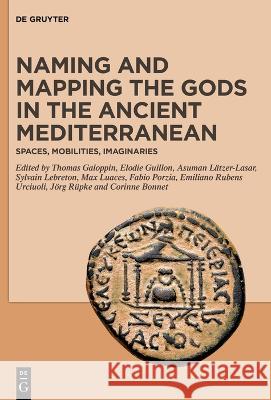Naming and Mapping the Gods in the Ancient Mediterranean: Spaces, Mobilities, Imaginaries » książka
Naming and Mapping the Gods in the Ancient Mediterranean: Spaces, Mobilities, Imaginaries
ISBN-13: 9783110796490 / Angielski / Twarda / 2022 / 1089 str.
Ancient religions are definitely complex systems of gods, which resist our understanding. Divine names provide fundamental keys to gain access to the multiples ways gods were conceived, characterized, and organized. Among the names given to the gods many of them refer to spaces: cities, landscapes, sanctuaries, houses, cosmic elements. They reflect mental maps which need to be explored in order to gain new knowledge on both the structure of the pantheons and the human agency in the cultic dimension. By considering the intersection between naming and mapping, this book opens up new perspectives on how tradition and innovation, appropriation and creation play a role in the making of polytheistic and monotheistic religions. Far from being confined to sanctuaries, in fact, gods dwell in human environments in multiple ways. They move into imaginary spaces and explore the cosmos. By proposing a new and interdiciplinary angle of approach, which involves texts, images, spatial and archeaeological data, this book sheds light on ritual practices and representations of gods in the whole Mediterranean, from Italy to Mesopotamia, from Greece to North Africa and Egypt. Names and spaces enable to better define, differentiate, and connect gods.











